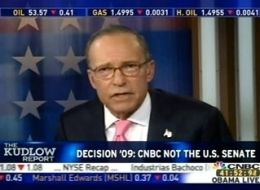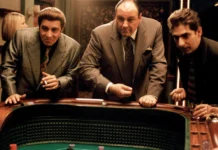[sgmb id=”2″]
The news today that Larry Kudlow, a CNBC TV market commentator and ex-Bear Stearns economist, maybe the next White House’s National Economic Council, (succeeding Gary Cohen who resigned) is another bad omen for individual citizens and investors.
Kudlow is an unabashed and unquestioning advocate who pushes the neoliberal mantra that free markets, trickle-down economics, and the proven abilities of the wealthy are what is needed to push the U.S. forward into greater eras of unfettered prosperity. Kudlow has never met a corporation, even those convicted of violating regulations, that he did not like.
He has been doing this for years like an automaton. Kudlow is famous for his unhinged statements about economic events. He famously said in a 2012 Club for Growth panel discussion on CNBC that one of the largest price-fixing scandals of the 20 century involving the London Interbank Offering Rate (LIBOR), that there were no victims. LIBOR is one of the most widely-used indices that dictates everything from mortgages to car loans. His statement that there were “no victims” of this price-fixing scandal on national TV shows he will say anything to protect the free-market system and big banks.
Kudlow’s Credibility Problem
Kudlow, a former economist with Bear Stearns, has admitted he misused alcohol and drugs, made this gross propaganda statement in defense of Barclays Bank around July 2012. In a short article in Slate.com, Elliot Spitzer called Kudlow out on protecting Barclays and was just amazed that a CNBC anchor would knowingly try to mislead the public about the LIBOR price-fixing debacle.
In the article, Spitzer quotes Kudlow as saying:
“I mean, maybe you’re right, the victim was the lender, Barclays. But I don’t know. The Justice Department says this could be a criminal prosecution. I don’t get that. Who are the victims? Who are the victims?”
For Kudlow to say there were no victims is ridiculous. At other networks and in another time, it could have cost him his job and certainly his credibility. Yet the LIBOR scandal remains a hot topic today because the investigation of the price-fixing is ongoing and the scope of the global scam has become more evident.
Kudlow certainly knew about the impact of LIBOR on international interest rate markets and the creditworthiness of major global banks. He may not have had the exact numbers, but basic research (if he had any ethical standards) would have shown that LIBOR controlled the rates in over $350 trillion in derivatives swaps contracts worldwide, including those managed by Fannie Mae and Freddie Mac (and most adjustable ARM contracts and other sub-prime mortgages), the TARP loans, the $40 billion in the Treasury’s purchase of AIG preferred stock, the Term Asset-Backed Securities Loan Facility (TALF), and covered everything from corporate borrowing to consumer auto loans to credit cards.
According to the author of the excellent book on this topic, Open Secret, Erin Arvedlund said LIBOR “had come to have the importance in finance of atomic time, of the longitude and latitude of the hemispheres.” Worse, the Fed and British banking regulators knew LIBOR was a fictitious number, but “a mix of fear, denial, and self-interest on both sides of the Atlantic left LIBOR in place,” Arvedlund wrote (page 65).
Yet with all the bank chatter about LIBOR being a fake number, including earlier articles in the Wall Street Journal a good four years earlier, Kudlow still insisted on making his naïve apology about “no victims” in the global price-fixing case.
This was common knowledge. So why would Kudlow make such a public, naïve, intentionally misleading statement?
Does a News Organization’s Ideology Determine the Facts?
One clue may come from the broadcast financial media itself, which is overwhelming extremely economically conservative, pro-laissez-faire, and unquestionably accepts trickledown economics.
Here, the majority of the more informed financial broadcasters (most often on CNBC, CNN, and Bloomberg) reflect the preferences of their bosses who are unquestionably pro-corporate, pro-conglomerate, anti-regulation and dislike liberal, anti-monetarist, anti-Austrian School, Ayn Randian economists. (Not surprisingly, MSNBC, which bills itself as the “lean forward” Progressive network, glaringly fails to cover political-economy and as a result, is missing out on the biggest untold stories of the decade, while also failing to advance the Progressive agenda.)
But while newsroom cultures are easy to identify, they are very difficult to change, especially in the broadcast financial era of well-financed ideological journalism, job intimidation, the pressure to fill 24-hour time slots with incessant banter, and beating the competition.
Yet while there is a solid connection between commercial journalism and capitalism, classic journalistic practices based on democratic principles (as espoused by Walter Lipmann) taught reporters to be open to iconoclastic approaches, while presenting as many sides of an argument that were relevant and attributable to reputable sources. Too much of that is absent today.











